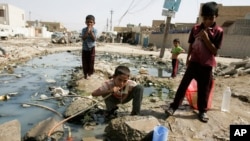Iraq is experiencing a marked increase in the number of cases of cholera, due to poor sanitation, unclean drinking water and the country's deteriorating electricity network.
Public service messages explain to Iraqis the dangers of cholera, how it is spread, and what its symptoms look like. Iraqi officials report over 120 cases of cholera in recent days in the capital Baghdad, nearby Abu Ghreib, and Najaf.
Dr. Mekki Baribar, head of the department of infectious diseases in Diwaniya province, told Alhurra TV that cholera normally manifests itself with heavy diarrhea, but with no pain, no blood in the stool and no fever. He said it occurs suddenly after contamination from food or water.
Iraq's Deputy Health Minister Khamis Sa'ad told journalists that the cholera outbreak in the Baghdad suburb of Abu Ghreib was due to the poor quality of the local water supply.
Iraqi media report that fighting in the area between Iraqi government forces and Islamic State militants has contributed to the outbreak. Thousands of refugees from Anbar province live in several tent cities in the region, all with poor sanitation facilities.
Several officials say Islamic State militants have blocked water from a local dam from irrigating the area, creating shortages and extra pollution. Other sources say that previous flooding contaminated drinking water facilities with sewage.
Middle East analyst James Denselow of London's Foreign Policy Center told VOA that the cholera outbreak is a sign of what top U.S. defense analysts are describing as the increasing lack of viability of regional states like Syria and Iraq.
“You're seeing a new type of politics emerging in places like Baghdad, where residents are incredibly frustrated by the poor quality infrastructure - electricity, power cuts, water, sanitation - that leads to things such as outbreaks of cholera. This is a real challenge for Iraq's politicians. It's not about necessarily governing and controlling a big tent coalition, but if you can't pick up the rubbish and keep the lights on, you're going to be unpopular,” Denselow said.
Iraq has seen weeks of protests across the country over poor services and corruption. Prime Minister Haidar al Abadi has sacked dozens of officials to streamline the government and remove corrupt politicians from office.








